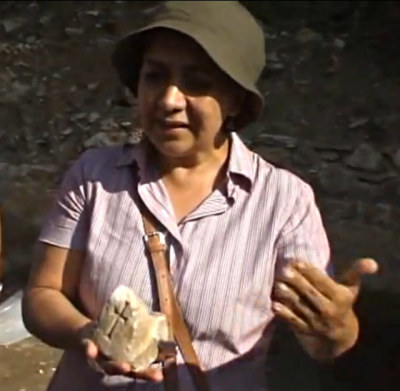Archaeologist Claims Piece of Jesus' Cross Found at Ancient Church in Turkey

An archaeologist overseeing a dig at Balatlar Church in Turkey's Sinop Province claims her team has discovered a 1,350-year-old stone chest containing "a piece of a cross" and which she believes possibly came from the one on which Jesus was crucified as recorded in the Gospels.
"We have found a holy thing in a chest. It is a piece of a cross, and we think it was [part of the cross on which Jesus was crucified]," Gulgun Koroglu, head of the years-long excavation at the site, told reporters. "This stone chest is very important to us. It has a history and is the most important artifact we have unearthed so far."
The stone chest in question is believed to have belonged to "a holy person" who could have used the chest to hold relics for veneration, NBC News reported.
Koroglu, an art historian and archaeologist at Turkey's Mimar Sinan University of Fine Arts, showed the item to reporters this week. The stone chest, or a fragment of it, was small enough to be held in one hand, and had cross symbols carved along its sides. The relic was still undergoing examination for authentication.
Sinop's mayor and the local police chief were also on hand for the briefing on the discovery.The mayor noted, "Excavations [like this one] will contribute a great deal to the future of Sinop."
"The excavation of Balatlar Church has been going on since 2009 and this stone is the most important piece we have found so far. We have also found a number of human bones during our excavation," Koroglu reportedly explained, adding that an ancient Roman bath had also been found at the site.
No reasons were stated as to why Koroglu believed the piece of wood found at the excavation site was possibly linked to Christ's crucifixion.
NBC reports on the legend of St. Helen, the mother of Emperor Constantine (who ruled from 306-337), claiming to have discovered Jesus' cross in Jerusalem. As the tradition goes, she handed out bits of the wood to church leaders in Jerusalem, Rome and Constantinople. These pieces apparently became so pervasive throughout the Roman Empire that 4th century theologian St. Cyril of Jerusalem suggested that the world "has been filled with pieces of the wood of the cross."
Koroglu said she hoped her team's efforts this year would be fruitful. She suggested that the area along the Black Sea could grow in popularity with visitors.
The excavation project at Balatlar Church, which was built in 660 during the Byzantine era, was being supported by the European Union-funded Field Management Project.



























